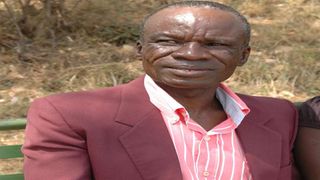Breaking News: Ruto postpones school reopening indefinitely due to flooding

Peter Gwengi , the programme co-ordinator, Upendo VCT in Homa Bay County.
| File | Nation Media GroupNews
Premium
Peter Gwengi: 'Accepting I had HIV saved my life'
What you need to know:
- It was his wife’s poor health that made him test for the virus.
- He learnt about his wife’s status, and eventually his own, in a cruel manner.
“Can you imagine for the many years since I signed a memorandum of understanding with my virus, I have lived a happy and peaceful life. We have been faithful to each other,” this was Peter Gwengi’s opening statement when we visited him at his home in Migori County.
It was his wife’s poor health that made him test for the virus. He learnt about his wife’s status, and eventually his own, in a cruel manner.
“She was seriously ill and admitted to hospital in Migori, but when there was no change, and her health deteriorating, I requested to move her to a better hospital. A nurse called me on the side and whispered, ‘why are you wasting your money treating her and she is going to die anyway. She is HIV positive’,” said Mr Gwengi.
He did not believe it. He called the family doctor, who confirmed that his wife was HIV positive and had been taking drugs for six years. She had kept the news away from him, perhaps due to fear of stigma and rejection. “For six years, living with someone and not knowing she is HIV positive, and many people, including some of my family members, knew her status. I was the only one who had been in the dark all along. It took a toll on me,” he said.
Opportunistic infection
Fearing the worst, but determined to get it over with, Mr Gwengi got tested for the virus. Even though he had prepared himself for the worst, when the test came back positive, he was devastated. Nine months later, his wife died. He lived in denial for two years, not talking about the disease to anyone — not even close relatives and friends — and refusing to take medication.
The two years were not easy for him. It was one opportunistic infection after another, but he would not accept that he had the virus. He thought of committing suicide.
He could not get out of his house or face his family or friends because of the stigma that came with the disease.
“One thing that I kept on asking myself — and I did not have an answer — is, where the disease came from. But thinking deeply, I believe I contracted HIV when I worked as a field officer in the early 1990s, a job that kept me away from home for long periods,” he said .
One day in 2001, he got seriously ill and was rushed to hospital unconscious. It was after several counselling sessions and being told that he was going to die and leave his three daughters orphans that made him accept his status. He then did everything he could to prolong his life.
HIV status
Telling his inner circle of friends about his HIV status was easier than he had expected, because he had accepted it.
He was placed on drugs, and thanks to his employer, Mr Gwengi was fully insured and would get his drugs using his medical card. Having seen how his wife suffered, he vowed to keep to the drugs regimen.
“One day, I woke up and told my virus now that we are partners and they are going to be part of me forever, they should not put me down and I will not disturb them. I would obey and follow all the requirements. And that’s how I have been living with my virus,” he narrated to the Nation.
Mr Gwengi said he maintains a well-balanced lifestyle, healthy diet, taking antiretroviral drugs on time, exercising, having adequate rest, and dropping bad habits such as taking excessive alcohol.
“HIV is a very jealous virus. If you are to take your drugs, for instance at 9pm, and you skip, it will eventually notice that something is not right and it will attack with several diseases until you adhere to the rules,” said Mr Gwengi.
Stress, he points out, is also dangerous and can undermine your health.
“This is one of the most faithful viruses. It does not want to be disturbed and it will not disturb you. All you need to do is just to accept that you have it and it will respond positively. Get yourself good friends and family members who encourage you positively.”
Mr Gwengi founded an advocacy organisation, where he runs campaigns to promote positive living and acceptance of people with HIV.





